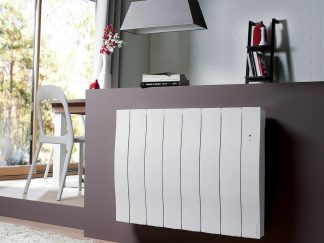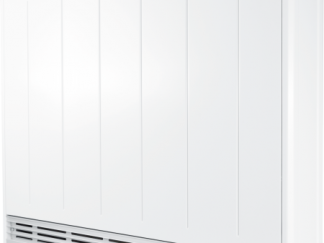Updated for Winter 2025
As winter continues to bite, we are still heavily reliant on our heating systems to keep us warm in our homes. Energy costs are set to rise again this year, and household budgets are still stretched. So, how can you heat your home as efficiently as possible? How can you keep your electric heating bill down?

In this article, we have suggested some cold weather heating tips for people with electric central heating or storage heaters in the hope that this will help you during what will be a challenging winter.
Keep radiators clear
Any item placed on top or in front of your electric heater is going to cause two problems:
- Fire hazard: Any object placed directly onto a heater for long periods of time can become a fire hazard
- Reduce efficiency: Anything that prevents heat from escaping your radiator, including clothes, will accumulate heat instead of letting it escape into the room where it’s needed
It’s important to keep all of your radiators clear. Provide enough space around your heaters to ensure they can do their job properly and heat your home effectively without costing you more than necessary.
Switch heating off in rooms you don’t use
By heating only the area where you’re most active, the heat generated in that room will remain there, and you won’t waste energy and money heating spaces you don’t use. If your heating system will let you, turn off heating completely in any empty, unused rooms. Modern electric radiators can operate independently of one another, so they make this simple to achieve.
And, according to The Energy Saving Trust, it’s better to keep doors closed for rooms that you don’t heat.
Don’t heat your home 24/7
During the coldest months, it can be tempting to keep your heating on all day and even during the night. People often say that it’s cheaper to leave the heating on low all day, rather than just turning it on when you need it. According to the Energy Saving Trust, this is a myth – you should only have your heating on when required.
It can be uncomfortable to get up during the night and feel cold. However, leaving your heating on 24/7, even at a low-ish temperature like 17 or 18 degrees, will cost you a significant amount of money.
This approach will also cause problems for your electric heating system – and the environment – in the long term.
Continue to ventilate your home
It’s extremely pleasant to have the windows open during the warmer months. We’re grateful for the breeze and the way it keeps our homes feeling fresh. However, ventilation is important all year round. In fact, it’s especially important in the winter, due to the humidity caused by being at home more and having the heating switched on each day.
Opening your windows wide for at least 5 minutes each day will prevent health problems and mould issues, all without putting a strain on your heating. The temperature in your home will dip slightly, but it’s worth it in the long run.
Welcome the sunshine in
It might not be the summertime any more, but the sun’s rays can still provide some heat for your home. Make the most of this free solar energy by ensuring the sun’s heat can reach your house. Remove any obstructions like overgrown trees and plants. You could also consider moving or removing any sheds or outside structures that block the sunshine coming in through your windows.
Warm the people, not the house
It’s much less expensive to keep yourself warm than your entire home. Wrapping up warm goes a long way to saving money on energy bills.
Target 20 degrees
For most people, 20 degrees Celsius is an ideal indoor temperature. Your electric radiators should have a programmable thermostat pre-fitted to them that gives you control over the room’s temperature. If your radiator doesn’t have these controls, it may be time to consider investing in a more modern and cost-effective electric radiator.
Each time you increase the temperature by 1 degree on your thermostat, you increase your heating bill that month by 6%. For example, if you increase your home’s temperature by 4 degrees from 20°C to 24°C, you would increase your heating bill by a frightening 25%.
And some people are fine with 19 degrees as a target temperature for their home, which will save even more money on the electricity bill. But the World Health Organisation says that a room temperature of 18 degrees is enough for healthy adults, with slightly higher temperatures needed for the very old or young.
Program your heating for the winter
Electric heating is at its best when it’s running on a heating schedule. Programming your heating using a modern electric heating controller like the Dimplex Hub, Atlantic CozyTouch, or the Haverland Ultrad SmartBox will put you in full control of your heating. That means you can turn individual electric radiators on and off and control the temperature in each room from an easy-to-use control panel or mobile app, as well as setting a program that helps you automate the whole process.

You will also be able to see the energy usage of each heater. This will help you identify which heater is working hardest, allowing you to investigate why and make any improvements to your windows or insulation in that particular room.
Upgrade older storage heaters and electric radiators
Storage heaters
Storage heaters have a reputation for costing too much money and running out of heat too early in the day. However, storage heater technology has come a long way in recent years.
New storage heaters include smart home heating features that make them an efficient solution, especially for flats and smaller homes. Features like advanced temperature controls and 24/7 programming will help you avoid wasted heat and energy. They have built-in digital thermostats and are able to adjust on their own. These thermostats ensure rooms are always kept at the right temperature to keep you comfortable.
Today’s storage heaters also come in a range of neutral colour tones to blend into modern interiors.
Electric radiators
Older models of electric radiators don’t include the latest energy-saving and money-saving features like window detection and built-in energy monitors. We recommend you replace older electric radiators if they are more than ten years old.
Check your home is well-insulated
A well-insulated house uses up to 45% less energy for heating than an uninsulated one. Although purchasing and installing new insulation will mean a modest initial outlay, this improvement will pay for itself very quickly in cheaper bills.
Cavity wall insulation can cut around £125 off your heating bill each year.
Effective insulation is one of the most effective ways to reduce your energy bills and keep your home warm. Consider adding loft insulation, cavity wall insulation, or external wall insulation. Installing modern double or triple glazing can significantly reduce heat loss through your windows as well.
Additional insulation tips:
- Seal up drafts: Caulk windows and doors to prevent cold air from entering
- Use weatherstripping: Add weatherstripping to doors and windows for a snug fit
Service your electric heaters every three years
Ensuring your electric heaters are serviced professionally at least every three years will keep them running at optimum efficiency. This will save you money year after year. You can also clean your electric radiators and storage heaters yourself to help maximise their efficiency.
Consider renewable energy
If you can, consider installing renewable energy systems such as solar panels and a storage battery. When combined with green energy from your supplier and energy-efficient electric heaters, these renewable energy systems can help you to reduce your reliance on fossil fuels and save money on your energy bills in the long term.
Upgrade your existing electric radiators
Aim to upgrade your electric heaters every ten years. This ensures you will have the most efficient models and can save money year after year, thanks to clever features like these:
- Flexible programming: If you can programme your heating day-by-day or hour-by-hour, you can then schedule your heating to come on only when you need it, for example, the times you are active in individual rooms.
- Built-in energy monitor: Some modern electric radiators have built-in energy monitors that allow you to to keep an eye on your energy usage easily. And for every degree of temperature you reduce your heating by, you’ll save up to 8% in energy cost.
- Adaptable start functions/timer: An adaptable start timer or built-in function will allow you to programme your radiator so that the room is warm and ready for when you need to use it.
- Open window detection: A radiator with built-in open window detection functionality will automatically shut down when it senses a fall in temperature within a set time frame. This saves you money by avoiding unnecessary heating.
- SMART controls: SMART stands for “Self-Monitoring Analysis & Reporting Technology”. Modern smart controllers and devices can learn what temperatures work best for you and your home.
A good electric radiator will start from as little as £160, depending on the manufacturer and size of the unit. The cost of buying electric radiators for your home will also vary depending on the number of rooms you have and the size of those rooms.
You can apply for a Home Energy Scotland loan to cover the costs of a new electric heating system, for example, adding high heat retention electric storage heaters to your home. At the time of writing, the loan covers up to £5,000.
Browse our range of modern, efficient electric heaters
-

Haverland RCTT Connect radiator
£352.68 – £648.46 Select options This product has multiple variants. The options may be chosen on the product page -

Haverland Geo Dry Stone radiator
£357.18 – £646.96 Select options This product has multiple variants. The options may be chosen on the product page -

Haverland Simply +
£293.53 – £518.17 Select options This product has multiple variants. The options may be chosen on the product page -

Haverland RCBL
£487.47 – £550.37 Select options This product has multiple variants. The options may be chosen on the product page -

Atlantic Sokio
£321.00 Select options This product has multiple variants. The options may be chosen on the product page -

Atlantic Low Surface Temperature
£321.00 Select options This product has multiple variants. The options may be chosen on the product page -

Dimplex Quantum HHR Storage Heater
£828.56 – £1,151.84 Select options This product has multiple variants. The options may be chosen on the product page -

Atlantic Galapagos radiator (vertical)
£446.47 – £545.69 Select options This product has multiple variants. The options may be chosen on the product page -

Atlantic Galapagos radiator (low height)
£327.41 – £396.86 Select options This product has multiple variants. The options may be chosen on the product page -

Atlantic Agilia IO radiator
£189.51 – £252.50 Select options This product has multiple variants. The options may be chosen on the product page -

Atlantic Oniris radiator
£285.87 – £404.70 Select options This product has multiple variants. The options may be chosen on the product page -

Atlantic Galapagos radiator
£277.80 – £446.47 Select options This product has multiple variants. The options may be chosen on the product page -

Atlantic Accessio radiator
£198.43 – £396.86 Select options This product has multiple variants. The options may be chosen on the product page -

Dimplex Saletto low profile panel heater
£259.47 – £349.36 Select options This product has multiple variants. The options may be chosen on the product page -

Dimplex XLE Slimline storage heater
£643.41 – £936.11 Select options This product has multiple variants. The options may be chosen on the product page -

Dimplex PLXE panel heater
£191.90 – £270.01 Select options This product has multiple variants. The options may be chosen on the product page -

Dimplex Q-Rad radiator
£397.13 – £477.58 Select options This product has multiple variants. The options may be chosen on the product page

















